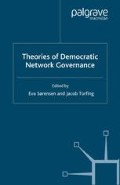Abstract
Governance network theorists have mainly been interested in the role of governance networks in enhancing governance efficiency while less attention has been directed towards the impact of governance networks on democracy. Their reflections about the democratic problems and potentials of governance networks have been relatively brief and sketchy. However, the content of these reflections are highly intriguing as they suggest that while governance networks certainly represent a threat to representative democracy they do not necessarily threat democracy as such. They could become a central building block in the development of new forms of democracy (Goss 2001; Jessop 2000b; Kickert et al. 1997: 174; Pierre & Peters 2000: 67; Rhodes 1997a: 21; Skelcher 2004; Wolf 2002). Bob Jessop (2000b: 17) claims that governance networks might prove valuable as a means of linking different units of democratic governance in the global, polycentric political systems of our time. Rod Rhodes (1997a: 9; 1997b: xiv) suggests that governance networks represent an important functionally organised supplement to the territorially organised institutions of representative democracy. Jan Kooiman (1993: 36; 2000: 143) regards governance networks as a promising way of enhancing the flexibility of democratic institutions in order to increase the adaptability of democracy to the specific characteristics of concrete governance processes. Fritz Scharpf (1999: 18ff) points to governance networks as an important means to increase democratic outcome legitimacy because they increase knowledge exchange and shared understanding between policy makers and stakeholders.
Access this chapter
Tax calculation will be finalised at checkout
Purchases are for personal use only
Preview
Unable to display preview. Download preview PDF.
Editor information
Editors and Affiliations
Copyright information
© 2007 Eva Sørensen and Jacob Torfing
About this chapter
Cite this chapter
Sørensen, E., Torfing, J. (2007). Theoretical Approaches to Democratic Network Governance. In: Sørensen, E., Torfing, J. (eds) Theories of Democratic Network Governance. Palgrave Macmillan, London. https://doi.org/10.1057/9780230625006_14
Download citation
DOI: https://doi.org/10.1057/9780230625006_14
Publisher Name: Palgrave Macmillan, London
Print ISBN: 978-0-230-22036-2
Online ISBN: 978-0-230-62500-6
eBook Packages: Palgrave Political & Intern. Studies CollectionPolitical Science and International Studies (R0)

